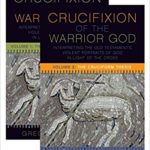We run our website the way we wished the whole internet worked: we provide high quality original content with no ads. We are funded solely by your direct support. Please consider supporting this project.

Divine Accommodation and the Cross: where Calvin was onto something
Over the last few posts, I’ve been arguing that the cross represents the thematic center of everything Jesus was about. Hence, rather than striving to have a “Christocentric” theology — which is so broad it means next to nothing—we ought to sharpen our focus by striving for a “cruciform” theology. I then offered some suggestions about how adopting a cruciform perspective might adjust our understanding of biblical inspiration.
Beginning today, I’d like to reflect on how a cruciform perspective might affect our understanding of “divine transcendence” and “divine accommodation.” The former is usually understood to refer to God as he is in himself, apart from his relation to creation. The latter refers to various ways God has had to adjust his appearance in order to communicate to us, given that our brain capacity is so limited, and our hearts so tainted with sin. The two are inseparable inasmuch as the second presupposes the first. That is, we could only recognize that God is accommodating himself in a given passage if we already know something about what God is like in himself, when he’s not accommodating.
I thought it might be fun to start my reflections on this topic with John Calvin, since he used the concept of accommodation more than anyone else in church history. Everyone assumes I don’t like brother John, but it’s not true. Well, maybe a little. I’ll readily admit that I find aspects of his doctrine of God, especially as it concerns “election” and “reprobation,” to be utterly horrific. I should also acknowledge that what I’ve learned about his personal life, especially the way he treated enemies like Michael Servetus, does little to boost my respect for him. At the same time, however, I want it to be known that I have found much in both his Institutes of the Christian Religion and his massive commentaries that I consider to be very insightful. Seriously.
I find some aspects of his use of the concept of divine accommodation to be helpful. In previous posts I’ve said that to read Scripture through the lens of the incarnation and the cross means we should read it with the awareness that God is a God who stoops to enter into our humanity and bear our sin. Calvin’s use of divine accommodation, at times, points in this direction. For example, regarding the depiction of Yahweh as a warrior waking up with a hangover in Psalm 78:65, Calvin said that this was a divine portrait that was “accommodated to the stupidity of people.” [1] So too, Stephen Benin documents the manner in which Calvin occasionally “pushed his approach [to accommodation] so far as to assert that the Holy Spirit…accommodated itself to vulgar error in order to enhance the meaning of its message,” as when he noted how the Psalmist expressed the erroneous view that cobras could make themselves deaf in Psalms 58:4-5.[2] Most surprising of all, Calvin wasn’t afraid of admitting that some portraits of Yahweh in the OT, such as his commanding his people to mercilessly slaughter defenseless women and children, were “utterly barbaric,” “crude,” “savage,” and “atrocious.” However, Calvin concluded that because it was God who did these things, and because God transcends our moral categories, we must acknowledge these otherwise “atrocious” actions to be “holy.”[3]
What I find intriguing, however, is that as much as Calvin used the principle of accommodation to explain difficult passages, and despite the fact that he was close to affirming that the Holy Spirit is willing to stoop to bear our stupidity and erroneous views, when it came to explaining depictions of God acting violently, Calvin instead appealed to his doctrine that God is above our moral categories (a doctrine which, if you think about it, implies that we have no idea what we mean when we claim God is “good”). Had Calvin placed the cross at the center of his concept of divine accommodation, I believe he could have explained the passages that depict God acting in “crude,” “savage,” and “atrocious” ways without having to say that “crude,” “savage,” and “atrocious” behavior becomes “holy” when applied to God.
Had Calvin made the cross central to his understanding of accommodation, he could have explained these violent portraits of God (as well as a multitude of other embarrassing or difficult passages) the same way he explained passages where the Spirit accommodates our “stupidity” and error. Had Calvin incorporated God’s sin-bearing character into his understanding of accommodation, he could have said what I would say: these violent, “savage” portraits anticipate the cross by pointing to a God who, out of love, stoops to bear the sin of his people, and thus takes on the semblance of a deity that is far less beautiful than he actually is– just as he did on the cross.
[1] Cited in F. C. Battles, “God was Accommodating Himself to Human Capacity,” Interpretation, 31 (1977), 19-38 (35).
[2] S. Benin, The Footprints of God: Divine Accommodation in Jewish and Christian Theology (New York: SUNY, 1983), 195.
[3] See D. F. Wright, “Accommodation and Barbarity in John Calvin’s Old Testament Commentaries,” in Understanding Poets and Prophets: Essays in Honour of George Wishart Anderson, A. G. Auld, ed. (JSOT, Supp. 152: 413-27; Sheffield: Sheffield Academic Press, 1993), 413-27 [427-28]. See also “Calvin’s Pentateuchal Criticism: Equity, Hardness of Hart, and Divine Accommodation in the Mosaic Harmony commentary,” Calvin Theological Journal, 21 (1986), 33-50.
Category: General
Tags: Calvinism, Cruciform Theology, Scripture
Related Reading

The Cruciform Way of the Lamb
In this video, Greg offers insight into how to read the Bible with the cross at the center of the revelation of God, thereby reframing how we interpret the violent and nationalistic passages of the Old Testament. Travis Reed from The Work of the People did a series of interviews with Greg a while ago and…

A Cruciform Magic Eye
In this post I’d like to share the story of how I came upon the thesis I’m defending in the book I’ve been working on for the last four years entitled The Crucifixion of the Warrior God: A Cruciform Theological Interpretation of the Old Testament’s Violent Divine Portraits. It’s a much longer post than usual,…

The Centrality of the Cross in Church History
Some readers of Crucifixion of the Warrior God may be assuming that the emphasis I’m placing on the cross is unprecedented in church history. While I will not deny that the cross-centered approached to interpreting Scripture’s violent divine portraits is new, the fact that I’m placing the cross at the center of my understanding of…

The Cruciform Center Part 3: How Paul’s Epistles Reveal a Cruciform God
As we’ve discussed, the four Gospels point to a cruciform revelation of God (click here and here for a review), but what about the most widely read writer of the New Testament? What did the Apostle Paul have to say about how the cross reveals who God is? Before turning to Paul’s writings, I’d like…

Reviewing the Reviews: Tom Belt (Part 1)
Tom Belt has written a four-part review of Crucifixion of the Warrior God on his blog An Open Orthodoxy. Parts 1 and 2 offer an overall fair and balanced summary of CWG, at least to the point that correcting misunderstandings would feel petty. In Part 3 Tom offers a critique of volume I, and this is what I’d like…

Podcast: Do We Apply a Cruciform Lens to the Writings of Paul Even Though He Writes After Christ?
Greg talks about Paul and Peter and the slow acclimation of Christ’s message in the early church. http://traffic.libsyn.com/askgregboyd/Episode_0413.mp3
